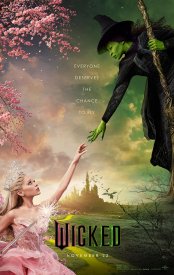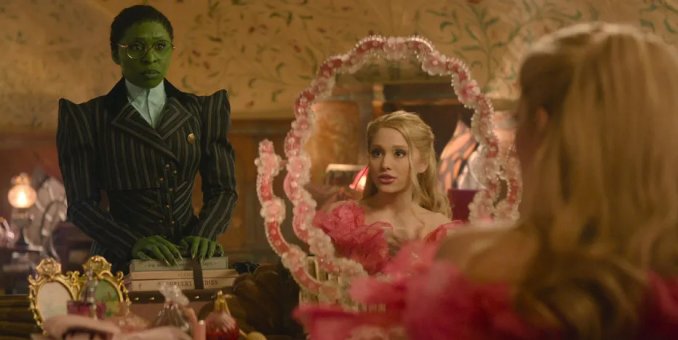
Although it opened on Broadway to mixed reviews from critics, the musical Wicked has become a something of an institution on the Great White Way. Premiering in 2003, the show is still playing to sold-out crowds and at present is the fourth-longest running production in Broadway history. And while it is unusual to adapt a stage production to film while the show is still running, we should be glad that they did in this case because director Jon M. Chu’s lavish big screen version is an astonishing delight, expanding the world of the musical as much as adapting the show from stage to screen. But for all of its vast sweeping camera moves showing off the vistas of the magical land of Oz and its legions of singing and dancing residents, Chu never looses sight of the core story of the show, not that the two actresses at the heart of the film would let him if he tried.
Loosely adapted from the 1995 Gregory Maguire novel Wicked: The Life And Times Of The Wicked Witch Of The West, Wicked tells the story of how Elphaba, the future Wicked Witch of the West, and Galinda, the future Good Witch of the North, met at the Ozian school of magic known as Shiz University and became friends only to have that friendship shattered by political forces beyond their control. It turns out that Elphaba has a powerful affinity for magic and Shiz University headmistress Madame Morrible (Michelle Yeoh) and the Wizard of Oz (Jeff Goldblum) see that as a way to help solidify his power over the people of Oz while falsely presenting to them the facade of a benevolent ruler.
It should be noted that Wicked is just the first half of a two-film adaptation of the Broadway musical, with the break between movies coming at the act break in the show. But that doesn’t mean that this first part is somewhat unsatisfying in terms of being a movie on its own. Chu keeps us invested in Elphaba’s character and her determination to take a stand for what she knows is proper and just with that character arc culminating in the film’s finale which features the show’s hit song “Defying Gravity.”
The first portion of Wicked deals with the two’s budding friendship and in some ways feels like a classic 1980s/90s teen comedy. Elphaba (Cynthia Erivo) is a social outcast, due in no small part to her unusual green skin. Galinda (Arianna Grande) is the most popular girl in school. pretty, rich and used to getting her way. Naturally, they are forced to share housing together, starting off on unfriendly terms before slowly becoming besties. There’s even a makeover scene in which Galinda vows to make Elphaba “Popular.” Much like in the original stage show, Grande’s Galinda threatens to steal the film out from under her co-star, perhaps partly due to Grande comfortably sliding into the template for the character established by Kristin Chenoweth on Broadway. But Erivo doesn’t let her take that chance, giving her all in both the dramatic portions of the role and the musical. We feel her hurt and anger at being rejected by her father, her love for her younger sister Nessarose, and her shifting feelings towards Galinda as they become friends. It is a tour de force emotional journey that she takes us on, and you feel it every step of the way.
Now we should point out that elements unique to the classic 1939 film adaptation The Wizard Of Oz starring Judy Garland are under copyright to MGM Studios, so they can’t be directly used. But that doesn’t mean that Chu doesn’t wink in their direction now and then. For example, a certain pair of slippers which will become much more important in the second film are silver, as they were in Baum’s original book, rather than encrusted with rubies as in the MGM version. But sharp-eyed viewers may notice a certain particular red gemstone that lines the inside of the box that the film’s silver slippers come in.
Those who are familiar with the original source novel or the stage musical will most likely be able to tell you that Wicked has a distinct political viewpoint baked into the story. The Wizard, who we know is just a magic-less carnival barker blown to Oz from somewhere in the midwest, resorts to numerous duplicitous things in order to consolidate his own power. And while watching the film, it is hard not to see parallels and echoes of our own current American moment. Granted, no one knew what the political landscape of the United States in 2024 would be like when they embarked on making this film two years ago or when the play was first brought to Broadway over two decades ago or when Maguire sat down to write his novel in the min-1990s. But that is the zeitgeist Wicked is being released in and that does add another layer of experience for the audience.





